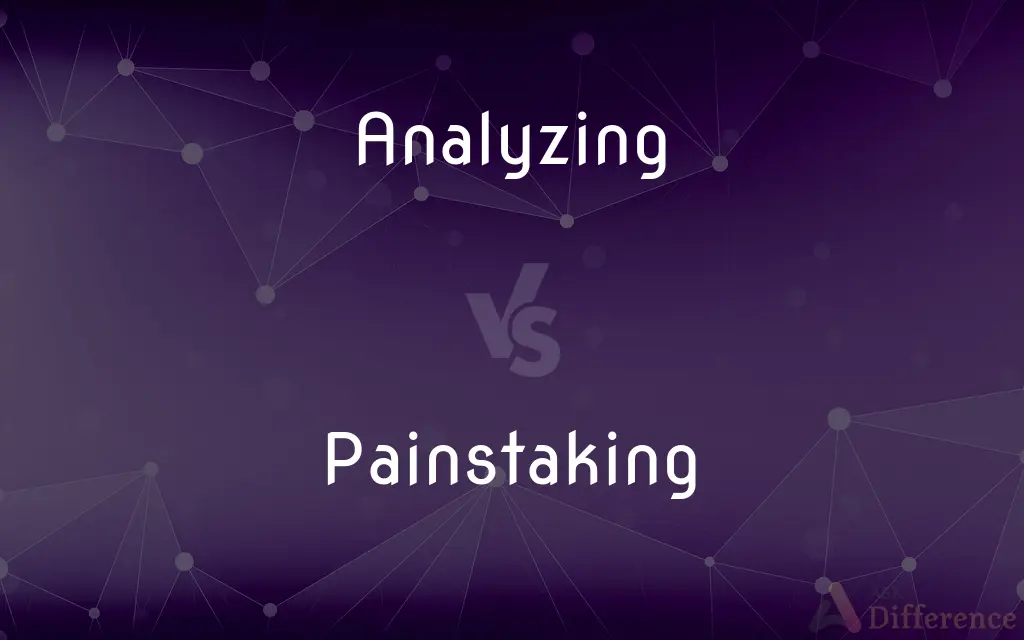Analyzing vs. Painstaking — What's the Difference?
Edited by Tayyaba Rehman — By Maham Liaqat — Updated on April 21, 2024
Analyzing involves examining details to understand structures or relationships; painstaking refers to performing tasks with extreme care and thoroughness.

Difference Between Analyzing and Painstaking
Table of Contents
ADVERTISEMENT
Key Differences
Analyzing typically refers to the process of examining and breaking down information into smaller parts to understand its structure or underlying relationships. This can be applied in various contexts, such as data analysis, literary criticism, or scientific research. On the other hand, painstaking describes an approach or effort characterized by extreme care and comprehensive attention to detail. This adjective often highlights the meticulousness and diligence required in an activity.
While analyzing often involves critical thinking and the use of specific methodologies to interpret data or phenomena, painstaking emphasizes the laborious and meticulous nature of the effort involved. Whereas analysis might be concerned with finding patterns or drawing conclusions, a painstaking process is focused on the accuracy and thoroughness of the execution.
In the context of work, someone who is analyzing might look for efficiencies, trends, or solutions based on the data at hand. On the other hand, a person described as painstaking might spend a considerable amount of time ensuring every part of their work meets high standards of precision and is error-free.
In scientific research, analyzing is crucial for testing hypotheses and interpreting experimental data. Whereas, painstaking work in this field ensures that experiments are conducted with rigorous adherence to protocols and that all variables are controlled as tightly as possible.
In creative fields such as art or writing, analyzing might involve a critique of styles, themes, or symbolism. Conversely, a painstaking approach in these fields could refer to the meticulous process of crafting a work of art or writing, paying close attention to every detail and aspect of composition.
ADVERTISEMENT
Comparison Chart
Definition
The process of examining something in detail
Involving or characterized by diligent care and effort
Focus
Understanding structures, relationships
Attention to detail, thoroughness
Contexts
Data analysis, scientific research, criticism
Any task requiring meticulous care
Outcome
Insights, conclusions
High-quality, error-free results
Associated with
Critical thinking, methodologies
Diligence, meticulous effort
Compare with Definitions
Analyzing
Interpreting results to form a hypothesis.
They are analyzing the survey results for a new marketing strategy.
Painstaking
Involving careful attention to detail.
Her painstaking approach to archaeology ensures no detail is overlooked.
Analyzing
Examining data to deduce relationships.
She spends her days analyzing market trends.
Painstaking
Executed with extreme care and thoroughness.
The painstaking restoration of the fresco took years.
Analyzing
Breaking down a complex process into simpler parts.
The engineer is analyzing the machine's malfunction.
Painstaking
Requiring meticulous care in tasks.
She gave the manuscript a painstaking review.
Analyzing
Studying material to understand deeper meanings.
He enjoyed analyzing classical literature.
Painstaking
Characterized by diligent effort and hard work.
He completed the model with painstaking accuracy.
Analyzing
Investigating symptoms to diagnose a disease.
The doctor is analyzing the patient's test results.
Painstaking
Involving thorough and careful processes.
The painstaking research contributed to a groundbreaking discovery.
Analyzing
To examine methodically by separating into parts and studying their interrelations.
Painstaking
Acting with, showing, or involving great care and attention.
Analyzing
(Chemistry) To make a chemical analysis of.
Painstaking
Usage Problem Attended by difficulties; arduous.
Analyzing
(Mathematics) To make a mathematical analysis of.
Painstaking
Carefully attentive to details; diligent in performing a process or procedure.
Analyzing
To psychoanalyze.
Painstaking
The application of careful and attentive effort.
Analyzing
Present participle of analyze
Painstaking
Careful in doing; diligent; faithful; attentive.
Painstaking
The act of taking pains; carefulness and fidelity in performance.
Painstaking
Characterized by extreme care and great effort;
Conscientious application to the work at hand
Painstaking research
Scrupulous attention to details
Common Curiosities
What does painstaking mean?
Painstaking refers to doing something with extreme care and meticulous effort.
How does a painstaking approach benefit work?
A painstaking approach ensures high precision and minimal errors, which is critical in fields like art restoration, scientific research, and any task requiring high accuracy.
Can analyzing be considered painstaking?
While analyzing can be meticulous, it primarily focuses on interpretation and understanding, whereas painstaking emphasizes the care and thoroughness of the process.
What traits define a painstaking worker?
Diligence, meticulousness, and a commitment to thoroughness define a painstaking worker.
In which fields is analyzing especially important?
Analyzing is crucial in fields like science, business, and academics where understanding and interpreting data is essential.
Is analyzing a skill or a process?
Analyzing is both a skill and a process involving critical thinking and systematic examination.
How does painstaking work affect project outcomes?
Painstaking work often results in higher quality and more reliable outcomes due to its thorough nature.
Can one be good at analyzing but not at painstaking tasks?
Yes, someone may excel in analytical thinking and interpretation but may not necessarily have the patience or meticulousness required for painstaking tasks.
What does analyzing typically involve?
Analyzing involves examining and breaking down information to understand structures or relationships.
What skills are important for effective analyzing?
Critical thinking, attention to detail, and methodological skills are important for effective analyzing.
Share Your Discovery

Previous Comparison
Snapdeal vs. Amazon
Next Comparison
Quartet vs. QuintetAuthor Spotlight
Written by
Maham LiaqatEdited by
Tayyaba RehmanTayyaba Rehman is a distinguished writer, currently serving as a primary contributor to askdifference.com. As a researcher in semantics and etymology, Tayyaba's passion for the complexity of languages and their distinctions has found a perfect home on the platform. Tayyaba delves into the intricacies of language, distinguishing between commonly confused words and phrases, thereby providing clarity for readers worldwide.














































